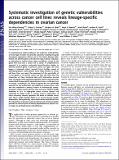Systematic investigation of genetic vulnerabilities across cancer cell lines reveals lineage-specific dependencies in ovarian cancer
Author(s)
Ren, Yin; Meyerson, Matthew L.; Drapkin, Ronny; Cheung, Hiu Wing; Cowley, Glenn S.; Weir, Barbara A.; Boehm, Jesse S.; Rusin, Scott; Scott, Justine A.; East, Alexandra; Ali, Levi D.; Lizotte, Patrick H.; Wong, Terence C.; Jiang, Guozhi; Hsiao, Jessica; Mermel, Craig H.; Getz, Gad; Barretina, Jordi; Gopal, Shuba; Tamayo, Pablo; Gould, Joshua; Tsherniak, Aviad; Stransky, Nicolas; Luo, Biao; Mesirov, Jill P.; Garraway, Levi A.; Lander, Eric S.; Root, David E.; Hahn, William C.; Bhatia, Sangeeta N; ... Show more Show less
DownloadCheung-2011-July-Systematic investiga.pdf (1.472Mb)
PUBLISHER_POLICY
Publisher Policy
Article is made available in accordance with the publisher's policy and may be subject to US copyright law. Please refer to the publisher's site for terms of use.
Terms of use
Metadata
Show full item recordAbstract
A comprehensive understanding of the molecular vulnerabilities of every type of cancer will provide a powerful roadmap to guide therapeutic approaches. Efforts such as The Cancer Genome Atlas Project will identify genes with aberrant copy number, sequence, or expression in various cancer types, providing a survey of the genes that may have a causal role in cancer. A complementary approach is to perform systematic loss-of-function studies to identify essential genes in particular cancer cell types. We have begun a systematic effort, termed Project Achilles, aimed at identifying genetic vulnerabilities across large numbers of cancer cell lines. Here, we report the assessment of the essentiality of 11,194 genes in 102 human cancer cell lines. We show that the integration of these functional data with information derived from surveying cancer genomes pinpoints known and previously undescribed lineage-specific dependencies across a wide spectrum of cancers. In particular, we found 54 genes that are specifically essential for the proliferation and viability of ovarian cancer cells and also amplified in primary tumors or differentially overexpressed in ovarian cancer cell lines. One such gene, PAX8, is focally amplified in 16% of high-grade serous ovarian cancers and expressed at higher levels in ovarian tumors. Suppression of PAX8 selectively induces apoptotic cell death of ovarian cancer cells. These results identify PAX8 as an ovarian lineage-specific dependency. More generally, these observations demonstrate that the integration of genome-scale functional and structural studies provides an efficient path to identify dependencies of specific cancer types on particular genes and pathways.
Date issued
2011-07Department
Harvard University--MIT Division of Health Sciences and Technology; Massachusetts Institute of Technology. Department of Electrical Engineering and Computer Science; Koch Institute for Integrative Cancer Research at MITJournal
Proceedings of the National Academy of Sciences
Publisher
Proceedings of the National Academy of Sciences (PNAS)
Citation
Cheung, H. W. et al. “Systematic investigation of genetic vulnerabilities across cancer cell lines reveals lineage-specific dependencies in ovarian cancer.” Proceedings of the National Academy of Sciences 108.30 (2011): 12372-12377. Web. 1 Feb. 2012.
Version: Final published version
ISSN
0027-8424
1091-6490